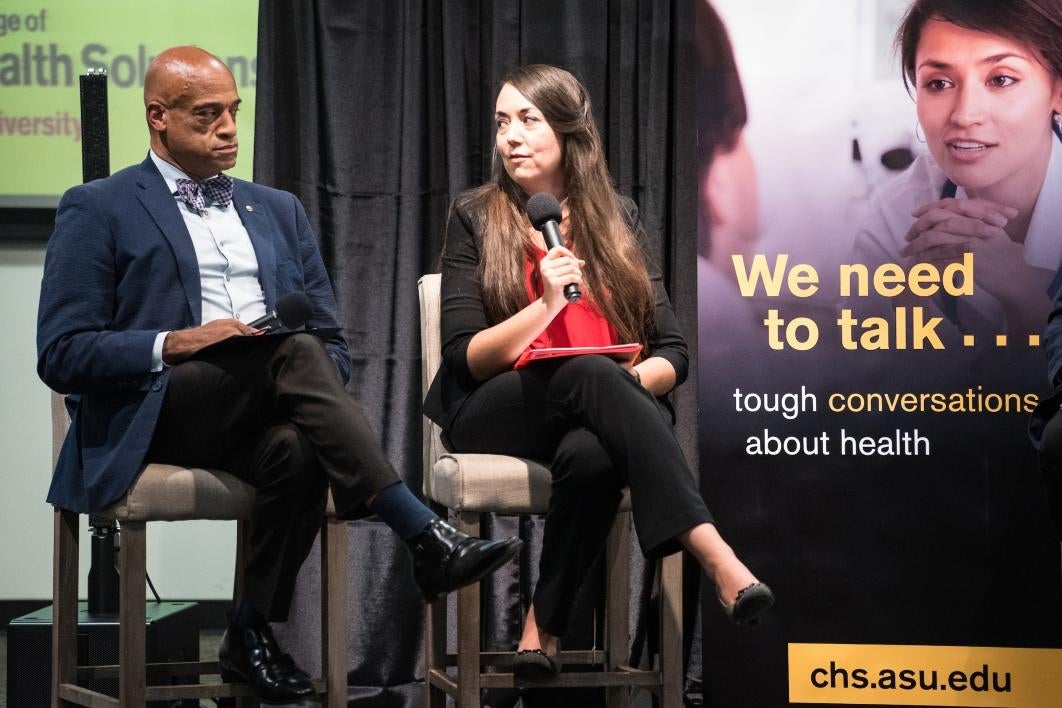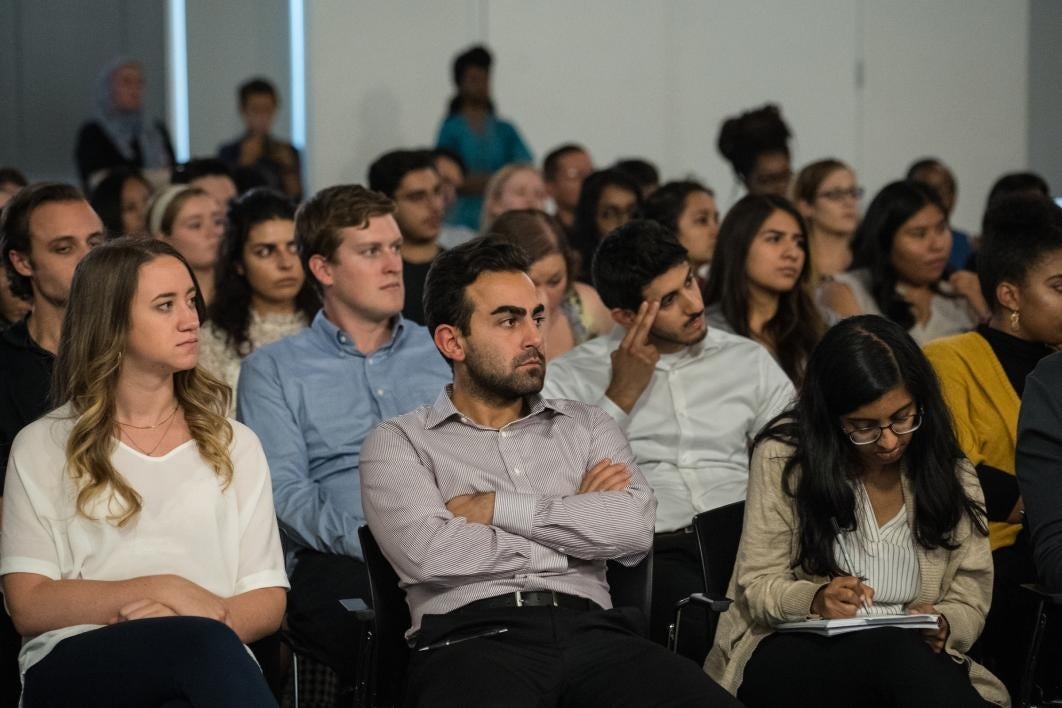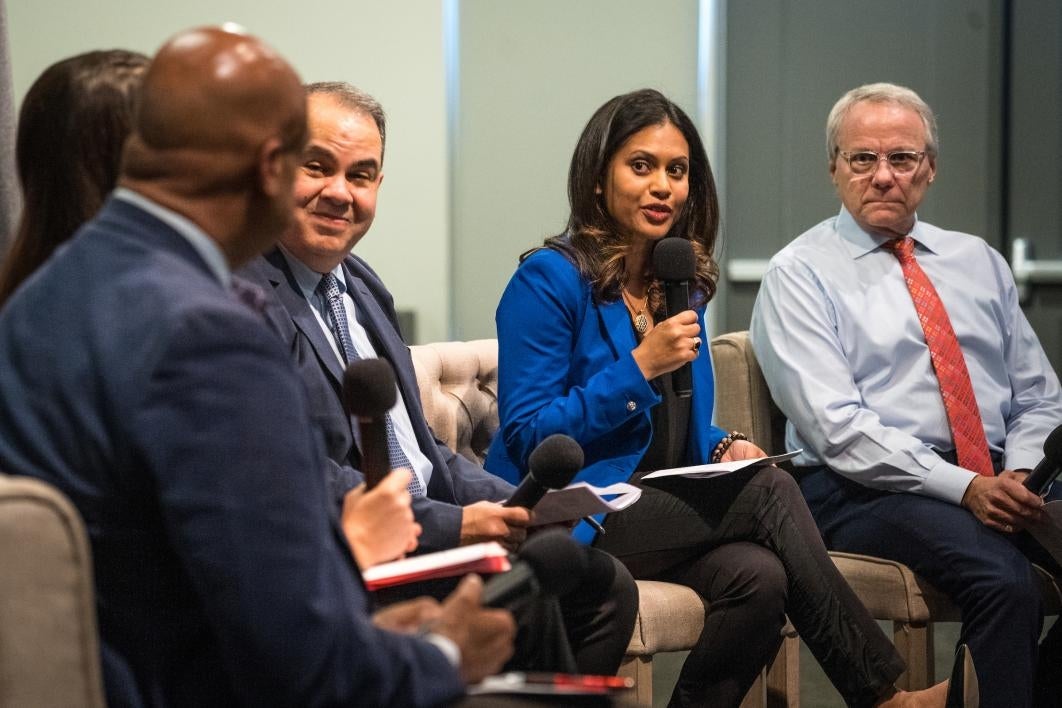If you’re like most 21st-century Americans, chances are you’ve crowdsourced what to do about a medical concern on social media — or worse, Googled it — and found yourself overwhelmed by the response, walking away with more questions than answers.
That’s why health communication and literacy is so important nowadays, says Mayo Clinic neurologist Joseph Sirven.
“We now have tools we never had. There’s a lot of noise coming from a lot of different areas, from social media to whatever your best friend is telling you,” he said.
The challenge is cutting through all that noise to get at the truth. That’s the goal of a new course offered at ASU co-taught by Sirven and College of Health Solutions Professors Swapna Reddy and Gregory Mayer, called “We Need to Talk — Tough Health Conversations: The Podcast Health Literacy Course.”
The course takes complex, and sometimes fraught, health topics such as research, practice and policy issues and distills them into a digestible podcast.
Students break up into three teams — background research, human voice and scriptwriting — to confront the issues, eventually rotating through each team over the course of a semester. Each team is headed by one of the three faculty, who specialize in medicine; law and health policy; and human communications and journalism.
The multidisciplinarity of the faculty, the group teaching model and the student teams are representative of a recent wave of experimentation in higher education that forgoes the traditional lecture hall method, instead treating each class of students as a cohort, and asking them to collaborate on big ideas instead of learning rote curriculum.
City University of New York English professor Cathy Davidson spoke about the phenomenon Tuesday at ASU when she delivered the 2018 Frank Rhodes Lecture on “The Creation of the Future.”
She called it a “provocative way of thinking” that has the potential to reform higher education.
The health conversations course was inspired by a series of panel discussions introduced by the College of Health Solutions last fall. Sirven said they realized they were attracting a substantial amount of students to the free public talks and wanted to find a way to engage them further, so that the subjects were not only more tangible, but also reflective of what really matters to them.
“We wanted to address the topics in a way that speaks to the young adult voice,” Sirven said. “How does an issue that seems far away, like dementia, affect a young person? What brings that to life for them?”
So he, Reddy and Mayer surveyed students, then sat down to see what concerns rose to the top.
The six they settled on (the first half of which will be covered during the fall semester and the second half during the spring semester) are: gender and ethnic diversity in the health care workforce; medical cannabis; dementia; fake health news; gun violence; and ADHD in adults.
“These topics are complicated and messy,” Sirven said. “There’s nothing simple about them. So they’re the perfect vehicles to teach students how to use all these things available at their fingertips to make them easily understood and useful to people. We also hope we spur on innovation and proffer solutions to some of these issues.”
Students and community members gathered Thursday, Sept. 13 in the AE England Building on ASU’s Downtown Phoenix campus for the first podcast taping, a panel discussion on gender and ethnic diversity in the health care workforce.
Reddy greeted the crowd of nearly 150, telling them, “I’m hoping the number of you is reflective of how important and relevant of a topic this is.”
The event began with a brief video clip providing an overview of the subject, featuring facts and figures as well as first-person accounts. One of them came from the mother of Milo Charbel, a senior double majoring in biological sciences and neuroscience, who recalled how she was made to redo her residency upon moving to the U.S. despite already having become an accomplished specialist in Europe.
Charbel, who originally signed up for the course because of his interest in science and educational podcasts, said it has opened his eyes to the prevalence of certain issues.
“I was surprised to see how big of a factor race is in health care,” he said. “I always thought that a physician is a physician, they’re just there to do their job and make you better.” But he was shocked to hear, for example, of instances in which people had refused treatment from doctors of another ethnicity.
Mayo Clinic women's health specialist Jewel Kling and director of community affairs Marion Kelly were the guest speakers at last week’s discussion. They fielded questions developed by students, including, “Does race really matter in health care?”; “Why do gender issues persist?”; and “What can be done to address these issues on a systemic level?”
(To hear Kling and Kelly’s replies, tune into KJZZ next week for the public airing of the podcast taping.)
Throughout the event, business and global politics junior Asha Ramakumar monitored the Facebook livestream and, later, during the Q&A portion, relayed questions from virtual audience members.
“The way this course bridges (several disciplines) and distills complicated information into a digestible format for the public is really unique,” she said. “These issues are pervasive and complex, and can only be discerned through conversations like these.”
Top photo: Business and global politics junior Asha Ramakumar monitors the Facebook Live feed at the "We Need to Talk — Tough Health Conversations" podcast Thursday, Sept. 13. Photo by Charlie Leight/ASU Now
More Health and medicine

College of Health Solutions alumnus named Military Medic of the Year
By Keri Hensley and Kimberly LinnJonathan Lu has looked out for the health of his fellow military service members his whole career, starting with his role as a combat medic in the U.S. Army.Driven by…

ASU, Mayo Clinic forge new health innovation program
Arizona State University is on a mission to drive innovations that will help people lead healthier lives and empower health care professionals to develop novel new health solutions. As part of that…

Innovative, fast-moving ventures emerge from Mayo Clinic and ASU summer residency program
By Georgann YaraIn a batting cage transformed into a custom pitching lab, tricked out with the latest in sports technology, Charles Leddon and his Mayo Clinic research teammates scrutinize the…



